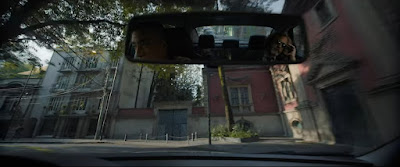or
Maybe Your Navel Isn't As Interesting As You Thought It Was (Please Don't Eat the Dieties)
There are only three directors in Academy Award history who have won back-to-back Oscars for Best Director: They are John Ford (one might expect that—he won four BD's in total, the most of any director), Joseph L. Mankiewicz, and Alejandro G. Iñárritu (yes, for Birdman in 2014 and The Revenant in 2015). That is quite an accomplishment—or, more precisely, achievement—and is one of those distinctions that will (as award-winners mock) lede their obituary ("Oscar winner George Clooney—Sexiest Man Alive 1997, "Batman"—died today in a freak accident..."). That is, ultimately, the most those things will affect your life—they don't guarantee work or continued success or even "top-shelf" status—but, there is the perceived burden of living up to it, despite what happenstance tilted the odds and eventuated the win.
And you can't discount Iñárritu's talent; even when his narrative is shredding, there are still images of such resonance in his films that you just want to stare at for awhile, whether to admire them for their beauty, imagination or just to wonder "how in the hell did he make that happen?"That's the case with his new one—it's on Netflix now—Bardo: False Chronicles of a Handful of Truths, which follows a journalist/documentarian of dual nationality traversing a void of magic realism through his life, relationships (with his family, his fame, and his country), and seeking answers. Sounds familiar. Feels like veiled auto-biography. And as for seeking answers, I'm right there with you, brother.
Shot (by the eclectic Darius Khondji) in wide-angle lenses that fold and bend space around the central protagonist, film-maker Silverio (Daniel Giménez Cacho), sucking you into his vantage point, the film follows a journey through various scenarios concerning his life, all linked by surrealistic transitions—for example, he could never walk from a nightclub-bathroom meeting with his dead father directly to the Asilo de ancianos where his alzheimic mother exists in one leisurely stroll—where memory and fantasy merge and coagulate to form the narrative. Figuring that narrative out (or even if you need to) is part of the point—and the problem—with the film.
One clue is the opening. A desert landscape. The shadow of a man runs and lifts into the air, his shadow no longer attached to the ground. It's a shot hop. He does it again. He's in the air a little longer. Third times the charm as he never falls back to Earth, but merely glides over the desert and the movie begins. I've had that dream. I've enjoyed that dream, and the most amazing thing about that dream is the unconscious thought while flying that it was the simplest thing in the world to do. But, I've seen that dream played out in other movies.
Specifically, Fellini's 8½—a movie so diffuse in subject matter that it doesn't even have a title, it's just the eighth (and one-half) movie that Fellini made. Fellini didn't go into complex bifurcated titles, but so many of the navel-gazing movies ("Take a swig of success. Swish it around, spit it out. Otherwise, it'll poison you.") that have been generated over the past few months (was it the pandemic?; too much time in your own head?) that so many of them, especially when they point out hardships with their privileged lives, could all be subtitled with the one that adorned the meta-Nicolas Cage movie from last year, "The Unbearable Weight of Enormous Talent." But, they are all "flights of fancy." Whatever the director fancies, of course.
I have no problems with this, really. I think a movie is really—really—successful when it tells it's story through images, rather than spelling everything out in dialog. This is probably to do with the first "whack-you-over-the-head" moment about the unique communicative power of film, which, for me, was 2001: A Space Odyssey. I couldn't figure that thing out, but after some research I had an epiphany where the movie grabbed me by my theoretical collar, shook me, and said "Everything you need to know to figure out the story is right up there on the screen because I deliberately decided what to show you without any hand-holding dialog, okay? O-kay?" From then on, I was hooked for life.
So, fine, let Iñárritu wander about the "twilight zone-ish" "liminal state between death and rebirth" touching on such things as grief for a life that's barely begun (or one beyond its shelf-life), dual-citizenship, national identity, the battle of Chapultepec, the conquering of the Aztecs by Cortes, the philosophy of Octavio Paz, and the symbolic death of Centéotl (research), and discovering that what a bunch of extras on a movie-set are chanting is actually the name of a popular Mexican game show. All grist for the mill. But, if there's a grain of truth at the end of it, well, as somebody in the film says: You always want to explain things. Somethings are just what they are."Is it all just the flashes of thought generated by a stroke-fueled coma? Does it have to mean anything so concrete? Is there a mystery that needs to be solved, or are we just hanging out in Marienbad waiting for something to happen—a murder, a scandal, an exploding helicopter, or even just a car smashing a fruit-cart?
Or is it just "Bardo: Stray Thoughts Realised with a Big Budget?" Iñárritu knows, and, evidently, he's not telling.












No comments:
Post a Comment